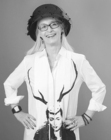Today I have the great pleasure of chatting with April Ford about their newly-released novel
Carousel, which I simply cannot wait to read.
About April Ford: April Ford’s story collection,
The Poor Children, published in 2015, was shortlisted for the international Scott Prize for a debut short story collection, and their story “Project Fumarase” was among the winning pieces featured in the 2016 Pushcart Prize anthology. April received their B.A. in Creative Writing and Professional Writing from Concordia University (Montreal, Quebec), and their M.F.A. in Fiction from Queens University of Charlotte (Charlotte, North Carolina). They spent time at Virginia Center for the Creative Arts as a Robert Johnson Fellow, and at Ucross Foundation as a Writer in Residence. From 2010–2017, they taught French and creative writing at State University of New York at Oneonta. Their writing has appeared in numerous print and online journals, including
Grain, New Madrid, Ploughshares, Beecher’s, Atticus Review, SAND, Santa Fe Literary Review, and
Gargoyle. They live in Montreal.
Can you, for those who don't know you already, tell something about yourself and how you became an author? I’ve always loved storytelling, but I became a writer more or less by process of elimination. That is, after my dream of becoming a serial killer profiler didn’t pan out, followed by some half-hearted attempts at entirely-unsuitable-for-me careers, I decided to enroll in a creative writing program and see where it brought me . . . and that was 18 years ago.
Describe yourself in 5 words or less! Mercurial, gregarious introvert, she/they.
Do you think Carousel would make a good movie?Of course! In fact, two important characters in the novel are likened to real-life actors. Who, you ask? If you read my novel, I promise you’ll find out ;)
What inspired you to write this book? Unhappiness with my personal life, plus my generally restless nature. I started writing
Carousel to escape the guilt I felt for wanting to leave a marriage that, to outsiders, seemed super-ideal. It was ideal, just not for me, and I was afraid to tell my partner. Every day for six years—the time it took me to write
Carousel—I woke up with a resolve to feel good about my situation, appreciate what I had, make it work. When I finally wrote the ending of the novel, which I had been avoiding for over a year (because of “writer’s block,” “inability to concentrate,” et cetera, et cetera), I knew another ending, in my off-page life, was inevitable.
How did you come up with the title of your first novel? I knew before I wrote the first line—I knew it in my gut. I knew, too, that I would make references to the Rodgers & Hammerstein musical in my novel. A few early readers told me I couldn’t do this, use the title of such a famous work even if I nodded to it, but I was entirely unreceptive to their warnings, because my gut, heart, and mind were made up. I told myself that if ever I received an offer of publication, I would be open to what the editor might have to say about the title. As it turns out, my publisher had nothing to say except to call my
Carousel a “beautiful novel.”
What is your favorite part of this book and why? The dream sequence (which is toward the end). As a young writer in an undergraduate creative writing program, I recall being told that dreams and flashbacks should be avoided at all costs. Years later, as a graduate student of fiction, I recall a similar warning winding its way through workshop groups. Sure, these techniques can be limiting and redundant when it comes to creating dimensional characters and plots with momentum, but they can also be just what you need to deliver key details or a set particular mood. For a story to have scope, it needs access to past and future, reality and surreality. I took full advantage of the “do not do’s” when I was working on
Carousel. A lot of the time, my intuition was spot-on—one of the perks of spending 6 years on a project, I suppose! And then there were times when I got so tangled up in technique that I had to step away from the manuscript-in-progress for days, weeks, even months. The scene that nearly drove me to abandon
Carousel entirely is where Margo (the narrator) sees her mother for the first time in decades. I was a mess because of that scene: my inability to execute it the way I saw it in my mind’s eye made me question why I was a writer at all. When I finally made it to the dream sequence, I had all the information I needed to make the scene work, and it was some of the most thrilling writing I’ve ever done, pulling more than two hundred pages of story into a character’s fevered psyche that lasts only a couple of pages.
Best Wishes for Carousel and thank you for chatting with me today! Readers, for more about April Ford, please check out www.aprilfordauthor.com
 newest »
newest »
 newest »
newest »




